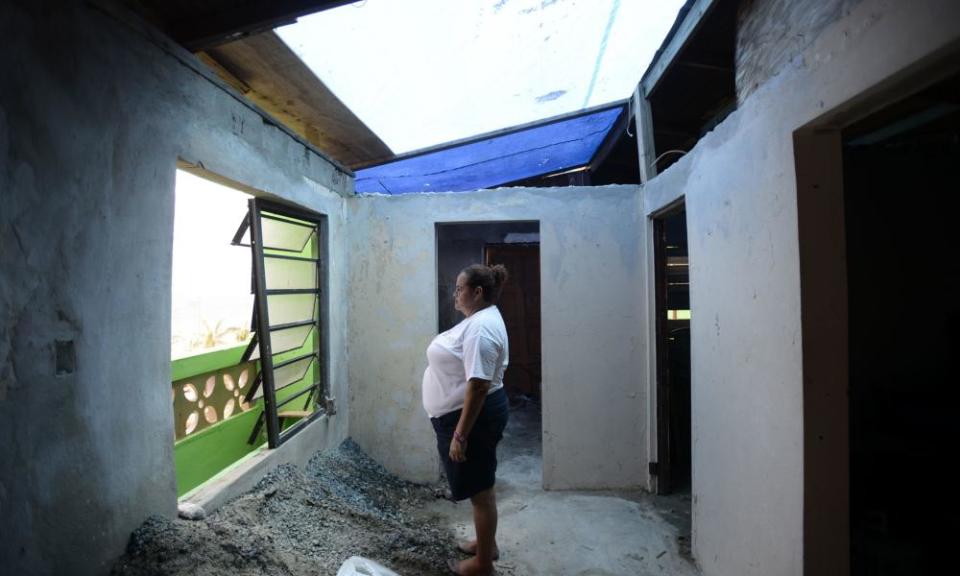Puerto Rico is on the brink of a humanitarian crisis. Where is the media? | Susanne Ramirez de Arellano
The destruction in Puerto Rico caused by Hurricane Maria has received relatively little attention. Are our disasters not important enough?

Hurricane Maria – the most powerful hurricane to hit Puerto Rico in 89 years – devastated the island when it hit early Wednesday morning. If the US government doesn’t act swiftly, 3.5 million people will face a catastrophic humanitarian crisis.
Currently, large parts of the island have no water, power or cellphone coverage. An incredible 1,360 out of 1,600 cellphone towers are down. According to some reports, it could take four to six months for electricity to be restored. Hospitals and other emergency services are struggling to cope.
As Maria made landfall, many Puerto Ricans on the US mainland and elsewhere scrambled to get news of their loved ones. Most, if not all of us, turned to social media. Why? Because we couldn’t trust major media outlets in the United States to give us in-depth coverage of the devastation. Our disasters, we figured, just don’t rate high enough in their eyes.
Sadly – we were proved right. The destruction in Puerto Rico received relatively little media attention compared to Hurricanes Harvey and Irma. Traditional broadcasters deployed a meager team of reporters. Even the Hispanic broadcasters on the mainland were found wanting in their coverage.
That’s why we relied on social media to relay vital information to family and friends. We used it to tell them which gas stations were open, which markets were still selling food and which banks still had cash. Social media became our life line.
Meanwhile, Donald Trump – usually so active on social media himself – was silent throughout the weekend on Puerto Rico. Instead of standing with those suffering, he chose instead to pick a fight with the NFL. Judging by his actions so far, few trust that he will do anything to bring attention to the devastation on the island, let alone address it in a meaningful way.
Because of Puerto Rico's colonial status, it is consistently ignored, as is clear from the response to this disaster
How are we meant to get the attention of the US president? One person suggested on Twitter: “If anybody reaches their families in Puerto Rico, tell them to #TakeAKnee” – a reference to the kneeling NFL players. “Maybe we’ll get noticed then.”
Political commentator Ana Navarro shared an equally grim idea on Twitter: “Friend from Puerto Rico: How do we get Trump to focus on us? Me: pick up tiki torches, stage a neo-Nazi protest. Then he’ll think ur ‘fine people.’”
Sadly, this treatment of Puerto Rico is no surprise. Because of the island’s colonial status, it is consistently overlooked and ignored. Nothing has made this clearer than the response to this disaster.
Consider that, as we speak, some vital supplies ships may not be able to reach the island because they don’t meet the requirements of an obscure rule, known as the Jones Act, which requires that all cargo ships docking in Puerto Rico carry a United States flag and an American crew.
Puerto Ricans have long maintained that the Jones Act, which is imposed on all US ports, is crushing the island’s economy. While a waiver was issued after Hurricanes Harvey and Irma, that hasn’t happened yet this time. This is shameful. Not only should it be waived, but it should be removed all together.
It’s also time to address the other slow-burning crises that Puerto Rico is facing. The island is suffering the most crushing economic and fiscal crisis of its history, brought about by a massive $70bn debt, which prompted the establishment of a fiscal control board, and a looming budget gap of more than $20bn.
To make matters worse, a soaring 12% unemployment rate has fueled a population decline that exceeds the 1950s Great Migration, stripping the island of its human capital as people head to mainland US in search of jobs.
Like the devastation caused by Hurricane Maria, these socio-economic crises are largely under-covered by mainstream press and ignored by politicians in Washington DC.
Puerto Rico is teetering on the edge of a humanitarian crisis, and the television cameras are still largely absent. And if you’re shocked by that, imagine what else they’re not showing you.
Susanne Ramirez de Arellano is the former news director for Univision in Puerto Rico

